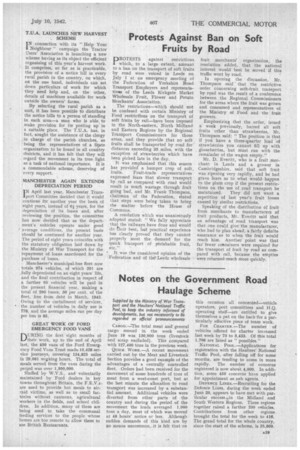Protests Against Ban on Soft Fruits by Road
Page 21

If you've noticed an error in this article please click here to report it so we can fix it.
PROTESTS against restrictions which, to a large extent, amount to a ban on the transport of soft fruits by road were voiced in Leeds on
July 1 •at an emergency meeting of the Federation of Yorkshire Road Transport Employers and representatives of the Leeds Kirkgate Market Wholesale Fruit, Flower and Potato Merchants' Association.
The restrictions—which should not he confused with certain Ministry of Food restrictions on the transport of soft fruits by rail—have been imposed in the North-eastern, North Midland and Eastern Regions by the Regional Transport Commissioners for those areas, and they provide that no soft fruits shall be transported by road for distances exceeding 35 miles, with the exception of strawberries which have been picked late in the day.
It was emphasized that this season has provided a bumper crop of soft. fruits. Fruit-trade representatives expressed fears that slower transport by rail as compared with road would result in much wastage through fruit going bad, and Mr. Frank Thompson, chairman of the Federation, stated that steps were being taken to bring the matter before the House of Commons.
A resolution which was unaniniously adopted stated: " We fully appreciate that the railways have done and would do their best, but practical experience has clearly proved that they cannot properly meet the demand for the quick transport of perishable fruit, etc."
It was the considered opinion of the Federation and Of the' Leeds wholesale fruit merchants' organization, the resolution added, that the national interest would best be served if this traffic went by road.
• In opening the discussion, Mr. Thompson said that the restrictive order concerning soft-fruit transport by road was the result of a conference between the Regional Commissioners for the areas where the fruit was grown and consumed and representatives of the Ministry of Food and the fruit growers.
Emphasizing that the order, issued a week previously; barred all soft fruits other than strawberries, Mr. Thompson said: "The position is that if you have a three-quarter load of strawberries you cannot fill up with gooseberries, but must run with the remainder of the wagon empty."
Mr. D. Everitt, who is a fruit merchant in Leeds and a grower in Cambridgeshire, said that soft fruit was ripening very rapidly, and he had grave fears as to what would happen to the plum crop if the present restrictions on the use of road transport be
maintained. They did not want a repetition of last year's fruit losses caused by similar restrictions.
Speaking of the distribution of fruit from merchants to Manufacturers of fruit products, Mr. Everitt said that an advantage of road transport was that one could give the manufacturer, who had to plan ahead, a fairly definite assurance as to when the fruit would reach him. Another point was that far fewer containers were required for the transport of fruit by road as compared with rail, because the empties were returned much more quickly.




















































